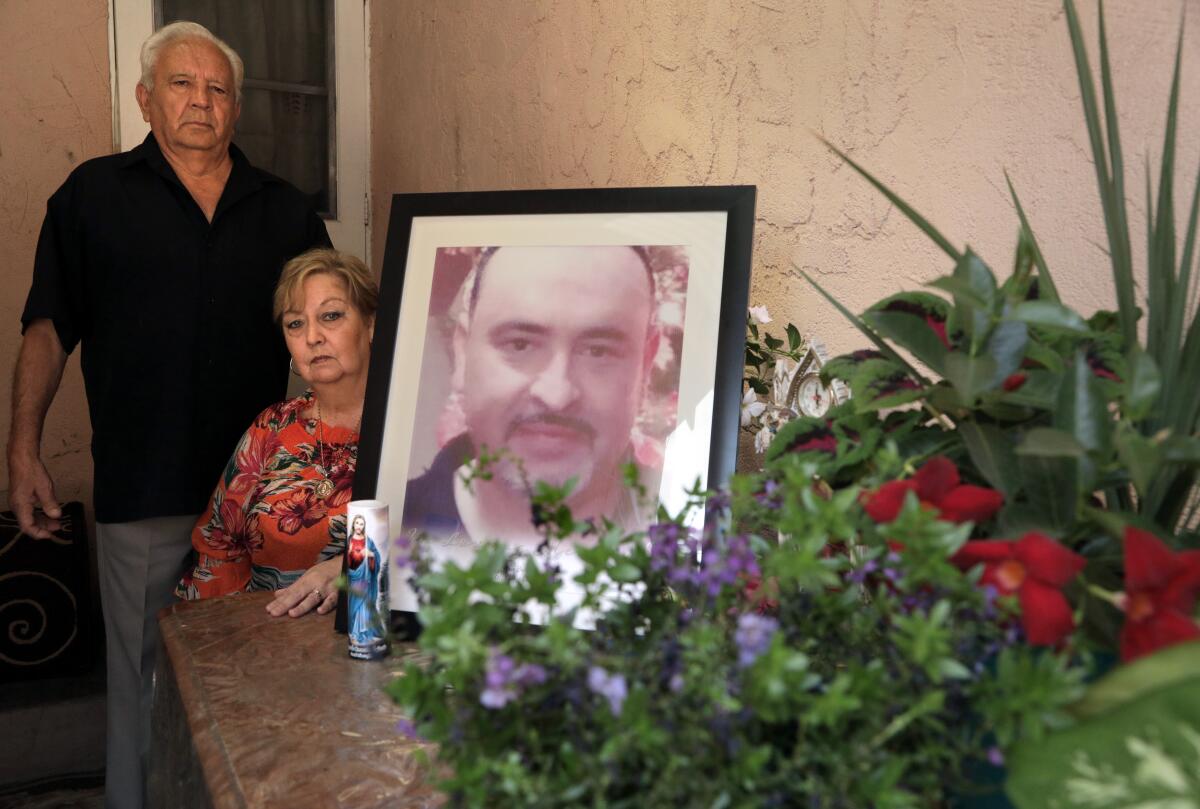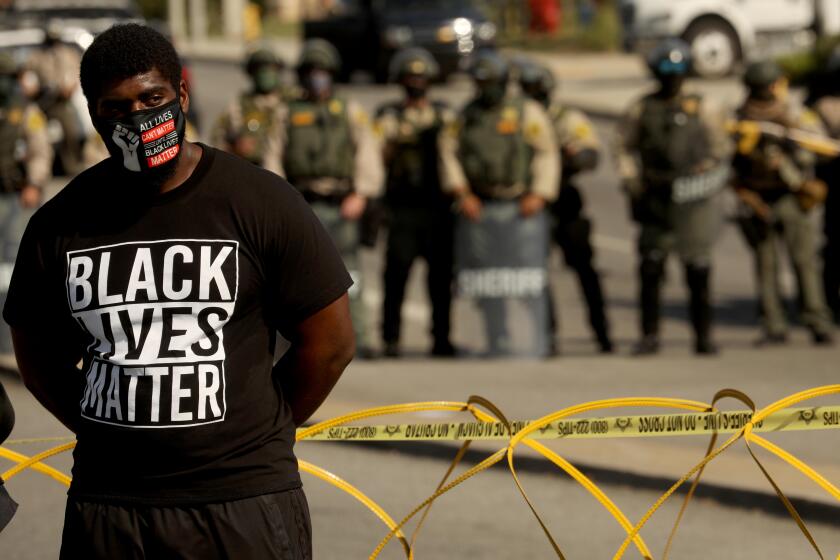D.A. declines to prosecute East L.A. deputies who beat and tased man who died

- Share via
Nine months after Los Angeles County agreed to pay more than $16 million to settle a lawsuit over the 2020 killing of Eric Briceno, the district attorney’s office has decided not to prosecute four sheriff’s deputies who beat and tased the 39-year-old inside his family’s Maywood home.
In a 20-page memo explaining their decision not to pursue the case, prosecutors said they could not prove beyond a reasonable doubt that Briceno “did not die as a result of an accident or misfortune.”
Though the memo indicated that Briceno was asphyxiated as the result of a type of neck injury often caused by strangulation or choking, none of the deputies admitted to using the type of force that would have caused that injury. Prosecutors posited that whoever did cause the fatal injury probably did not do it on purpose.
The decision not to pursue charges came as a disappointment to the Briceno family and their lawyers.
“He has injuries that are consistent with someone wrapping their arms around his neck,” said attorney Mark Pachowicz. He noted that Briceno had a broken hyoid bone in his neck, broken blood vessels in both eyes, and blood in his lungs. “The D.A.’s office should not be done with an investigation until they can answer the question: How were the injuries inflicted that killed Mr. Briceno?”
The Los Angeles County Sheriff’s Department said in a statement to The Times that the case was “fully investigated” by homicide detectives before it was turned over to prosecutors. Now the matter will go back to the department for an internal administrative review. All four of the deputies involved are still on active duty.
“Every loss of human life is tragic,” the statement said. “Our hearts go out to the family.”
Ken Yuwiler, whose firm is representing the deputies in their administrative proceedings, welcomed the district attorney’s decision.
“Had the suspect just given up and allowed himself to be arrested, no force would have been needed,” he added. “But if they fight, the deputies have an obligation to protect the victim and arrest the suspect — and the deputies did so.”
On the morning of March 16, 2020, Briceno got into a physical altercation with his father and then left the house. Briceno had been diagnosed with mild schizophrenia as a teen and had a long history of self-medicating with drugs, his family said previously. The day of the dispute, prosecutors said, his parents asked him to leave the house because they suspected he’d been using drugs again.
A little before 11 a.m, his mother called 911, but Briceno left before the first sheriff’s deputy arrived.
Eric Briceno’s parents said they called the 911 to help their son during a mental health crisis. But by the end, they said, he’d been beaten and Tasered to death.
According to the district attorney’s memo, Briceno’s father told deputies his son had smashed his face into a bed, smothering him until he nearly lost consciousness. The deputies spotted blood on his neck and face, and a three-inch laceration on the left side of his head. But since Briceno wasn’t home, the deputies told his parents to call back if he returned.
A few hours later, he did. The details of what happened next, as laid out in the district attorney’s memo, are chaotic, with the responding deputies offering slightly different details of the close-quarters struggle that began after they showed up at the Briceno home a little before 4 p.m.
Briceno — who was 6 feet tall and weighed nearly 300 pounds — was in his bedroom lying down when deputies arrived. His mother told The Times last year that she asked them not to go in the room for fear they would startle him, and instead offered to go get Briceno herself. But the deputies went in anyway.
“They went, ‘Eric, Eric!’ So he got scared,” his mother said. “He wasn’t doing anything; he wasn’t aggressive, nothing.”
According to his mother, the deputies began beating him without provocation, kneeling on his back and hitting him with a baton.
According to the district attorney’s memo, Briceno initially stayed in bed and ignored the deputies, then abruptly kicked one in the chest. He allegedly stood and charged at them when they approached. Deputy Danny Galvez tased him but said it didn’t seem to have any effect. The deputies said Briceno started to charge again, so Galvez jumped on his back. They tumbled to the ground, with Briceno on top of the deputy.
Eventually, Briceno allegedly got hold of a female deputy’s arm. Fearing he was going to take her gun, the deputy said, she elbowed him in the face. At that point, other deputies said they also punched Briceno in the face repeatedly. The struggle continued, and eventually Galvez put his Taser “directly on Briceno’s midback and deployed it again,” according to the memo. “The Taser did not cause Briceno to cease struggling and he yelled, ‘Just shoot me already!’”
At some point, one deputy unleashed pepper spray. Once they finally got Briceno handcuffed, the deputies carried him out to the living room, where they realized he appeared unresponsive, according to the memo.
“None of the deputies reported using a choke hold, or carotid restraint,” the memo said, referring to a headlock-style hold that can cause a person to lose consciousness by restricting the flow of blood to the brain.
Blanca Briceno, Eric’s mother, previously told The Times she pleaded for the deputies to stop and heard her son scream that he couldn’t breathe. She took out her phone to record, she said, but a deputy took it away.
While Briceno was taken to the hospital, deputies took his parents to the East L.A. station for questioning. Neither knew whether their son was still alive. After the interview, the Bricenos said, investigators returned and told them he’d died within minutes of arriving at the hospital.
When the autopsy report came back six months later, it said Briceno had been punched, pepper-sprayed and hit with a Taser seven or eight times. He also had methamphetamine in his body when he died, but the report said that was not the immediate cause of his death.
Instead, the death was deemed a homicide due to cardiopulmonary arrest resulting from neck compression and restraint with a Taser.
Briceno’s death occurred just two months prior to the police killing of George Floyd in Minneapolis, but his case did not make national headlines or trigger protests, even during a summer marked by so many of them. Later that year, his family filed a wrongful-death claim — the precursor to a lawsuit — and called for prosecution of the deputies involved. Before going to trial, the case settled last year for $16.2 million.
“He didn’t die a natural death,” Briceno’s father, Juan, told The Times previously. “He died because of police brutality.”
In their analysis, prosecutors said deputies used only the amount of force necessary to arrest Briceno.
“It was not until Briceno ultimately lost consciousness that he stopped resisting,” the memo said. “During the fight, Briceno suffered a neck compression that caused him to asphyxiate. Although we do not know definitively who caused the neck compression, the evidence suggests that it likely happened when Galvez jumped on Briceno’s back and they both fell to the floor.”
But because Galvez said afterward he did not intend to grab Briceno’s neck, the district attorney’s office concluded there wasn’t enough evidence to prove criminal liability.
“There is no evidence that Galvez intentionally asphyxiated Briceno,” the memo said. “Finally, it was Briceno’s actions that caused the deputies to use the physical force employed to arrest him.”
Los Angeles Dist. Atty. George Gascón announced Friday his office will not pursue charges against the deputies involved in two separate high-profile shootings of teenagers.
In recent months, the district attorney’s office has declined to prosecute several other controversial killings at the hands of sheriff’s deputies. In April, prosecutors announced they would not pursue charges against the deputies who fatally shot 16-year-old Anthony Weber in 2018 or against the deputies who killed 18-year-old Andres Guardado two years later.
In both cases, deputies said they saw the teens reaching for weapons, but in one case no gun was recovered and in the other the teen never pointed it at authorities. Prosecutors said there was “insufficient evidence” to prove beyond a reasonable doubt in both cases.
This month, the district attorney’s office also declined to pursue charges in another high-profile use-of-force case from spring 2020, when the same two deputies who later killed Guardado allegedly kidnapped and threatened a skateboarder named Jesus Alegria. Prosecutors said they believed there was in fact enough evidence to charge — but they decided not to because both former deputies were already indicted in federal court earlier this year. One, Chris Hernandez, agreed to plead guilty to conspiring to violate Alegria’s civil rights by forcing him into the back of a patrol car and then trying to cover it up with a falsified report.
As in the Briceno case, the Weber, Guardado, and Alegria cases all resulted in lawsuits that the county had already settled before prosecutors declined to pursue charges. Ultimately, the county agreed to pay more than $12 million on the three cases combined.
More to Read
Sign up for Essential California
The most important California stories and recommendations in your inbox every morning.
You may occasionally receive promotional content from the Los Angeles Times.












